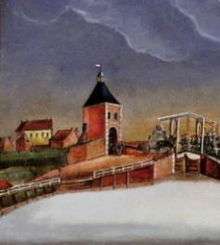Poorter
Poorter (Dutch pronunciation: [ˈpoːrtər]) is an historical term for a type of Dutch, or Flemish, burgher who had acquired the right to live within the walls of a city, and also had city rights.
This poorterrecht or poorterschap,[1] or citizenship, could be gained by paying a sum of money to, and registering, with the magistrate of the city. The payment of money was to prove that you weren't poor, and that you could maintain a household. There were also religious restrictions, and numerous cities forbade Jews from attaining citizenship until the French Revolution. An oath was also taken. Some cities also had grootburgers (literally: great burghers), who received more rights than normal citizens, but had to pay a higher price to acquire it.
The city would be surrounded by a city wall, and a moat, which offered safety, and protection, of a certain level, to its citizens. At nightfall, the city gates would be closed by the gate watch. The Keys to the city were handed to the Burgemeester, and returned again the next day.
The entire citizenry of a city was sometimes called the Poorterij (literally: Portery).
References
- Simon Schama, The Embarassment of Riches: An Interpretation of Dutch Culture in the Golden Age, Berkeley, University of California Press, 1988, p. 587.
